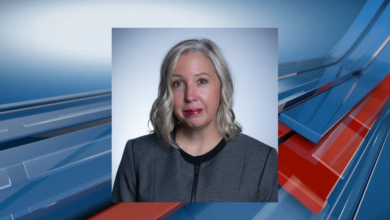No one knows whether Trump’s $50B for rural health will be enough | News, Sports, Jobs


The picture has allotted the designed Congress 50 billion {dollars} to rural hospitals and medical companies suppliers to calm fears of different billions of historic reductions for federal well being care spending signed by President Donald Trump on Independence Day. However is that this bandage nice sufficient to save lots of the troubled rural hospitals?
Congress has put apart $ 50 billion for rural hospitals and medical companies suppliers to calm fears of different billions of historic reductions for federal well being care spending signed by President Donald Trump on Independence Day.
However is that this bandage nice sufficient to save lots of the troubled rural hospitals?
“I’ve extra questions than I’ve solutions.” “No one has these solutions but.”
Morgan famous that the brand new cash for rural well being, which can spend over 5 years, is way decrease than $ 155 billion in spending reductions in rural areas over 10 years, as estimated by KFF, a non -profit well being analysis group. In Pennsylvania, the loss can be 6.38 billion {dollars} over the subsequent decade.
Greater than half of the cuts within the legislation in rural areas in 12 states are concentrated with giant rural inhabitants and MEDICAID expanded below cheap costs to cowl extra individuals, in accordance with KFF: Illinois, Kentucky, Louisiana, Michigan, Minnesota, Missouri, New York, North Carolina, Ohio, Oklahoma, Penfania.
Consultants, hospital leaders and legislators on either side of the hall concern that Trump’s signing laws will result in the gut of hospitals and rural clinics specifically, which sees a needed share of sufferers who’re secured by Medicaid, medical health insurance within the federal state of low -income individuals. The brand new legislation will descend greater than $ 1 trillion of Medicaid over the subsequent ten years to assist pay the worth of tax cuts that aren’t commensurate with the rich.
The $ 50 billion addition was an try by Republican leaders in Congress to win the votes of colleagues of their occasion, who initially handed in assist of those sharp cuts to Medicaid and different well being companies.
Within the US Senate, the agricultural program helped safe the reasonable Republican Senator vote in Alaska Lisa Morkovsky, which expressed concern in regards to the impression of the legislation on well being care in its mandate. About 1 out of three Alaska is secured by Medicaid.
Jared Kosen, president and govt director of the Alaska Hospital and Well being Care Affiliation, mentioned he’s deeply annoyed by the brand new legislation to finance medical support, which is believed to be everlasting harm to Alaska. He mentioned that the Republicans have prevented potential options by throwing cash on a program.
“It’s annoyed within the public area when such selections are made shortly and admittedly, detached,” he mentioned.
“The results will fall on us, and never for them.”
Some lawmakers of the Republican Celebration of Congress with the agricultural program of $ 50 billion as a victory for well being care. However it’s nonetheless unclear, i.e. hospitals, clinics and different service suppliers that may obtain cash and the way a lot.
Find out how to work
The Rural Well being Transformation Program will register $ 10 billion yearly from the monetary years 2026 to 2030.
International locations should apply for financing by the top of this yr, and submit an in depth plan on the way to use it.
The legislation defines some strategies that the states can use, in accordance with the evaluation of the laws from the occasion coverage middle:
Pay funds to rural hospitals to assist them keep fundamental companies equivalent to sponsoring the emergency room, work and supply.
Utilizing and coaching rural docs, nurses and different well being staff.
– Enhancing medical emergency companies equivalent to ambulances and EMTS.
Utilizing new applied sciences, together with distant well being care.
Offering the therapy of opium dysfunction and psychological well being companies.
Enhancing preventive care and managing continual ailments.
Half 10 billion {dollars} can be distributed equally throughout the states which have utilized for it. The opposite half may be distributed by the Federal Middle for Medicare & Medicaid – at the moment Dr. Mohamed Oz – in accordance with his discretion, primarily based on rural well being amenities within the state.
Though this system doesn’t substitute the quantity that states more likely to lose, Morgan mentioned it’s nonetheless a chance to rethink the way to finance rural well being care. He want to see nations that give flexibility in how they can use cash, and hope to deal with sustaining the well being of rural societies by preventive care with the dearth of assist of hospitals to maintain their doorways open.
“If that is completed appropriately, it might actually change the long run path of America,” mentioned Morgan. “That is troublesome, although.”
Essentially the most troublesome blow
Kentucky can get the best success of lowering the brand new legislation within the rural financing of the Modigi, because it misplaced an estimated $ 12 billion over 10 years, in accordance with the KFF evaluation.
Kindra Metal, a cupboard spokesperson for Kentucky Well being and Household Providers, mentioned in a press release that the state’s medical support division continues to be awaiting further federal directives to grasp how the state program was affected, Kendra Metal, a cupboard spokesman in Kentucky Well being Providers and Household, mentioned in a press release.
She wrote: “Greater than 1.4 million Kontocyan depends upon medicaid – together with half of all youngsters in our states, the aged and probably the most susceptible inhabitants – and the approval of laws on the federal degree can have severe results for these people, rural well being care, hospitals and native economies.”
Himi Thoson, CEO of the state’s well being coverage, a non -partisan group that helps nations in well being care insurance policies, mentioned that even with the brand new program, the states all through the nation should reassess their budgets in mild of the reductions, mentioned Hemy Topareson, Govt Director of State Coverage, a non -partisan group that helps nations in well being care insurance policies.
She mentioned: “Each area is slightly completely different and there’s no method that fits everybody.” The possession of the hospital differs [as well as] Sorts of companies which are decisive to society the place it’s situated. They’ve to consider new methods to offer these companies in a context with much less assets. “
About 44 % of rural hospitals work in pink, in accordance with the KFF evaluation of Rand Hospital knowledge, a share above 35 % of hospitals in city areas.
“The countryside within the coronary heart”
Earlier than the draft legislation handed, Oz tried to reassure Republicans within the Home of Representatives that their areas might get cash from this system even when they weren’t specifically rural, in accordance with Politico earlier this month.
The Republican Republican Republican Republican in Pennsylvania mentioned that the cash will begin flowing to his area early at first of subsequent yr, because the chief of the Wilkes Barre Occasions informed the sooner this month that he had met Trump, Azoz and others to safe pledges that hospitals in his space might attain the fund. The northeastern nook of Pennsylvania, which incorporates the suburban and rural areas, in addition to the cities of Skranton and Wilks Bar.
Though laws consists of pointers by which amenities or fields qualify as “rural”, Morgan, from the Nationwide Rural Well being Affiliation, expects loopy impulses from legislators and repair suppliers to demand the agricultural scenario to be able to get hold of funding.
“This can be an enormous drawback – figuring out who’s the countryside,” Morgan mentioned. “We’re all in our coronary heart in terms of cash.”
– – – – –
STATELINE is a part of Information Room, a non -profit information community supported by grants and a donor coalition as a common charity 501C (3). STATELINE maintains liberal independence. Contact the SCOTT S. Greenberger questions: data@stateline.org.
2025-07-22 05:23:00




